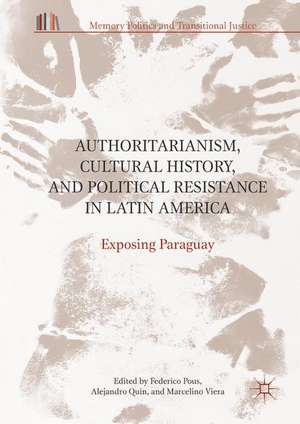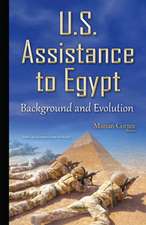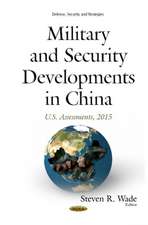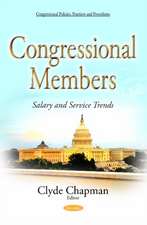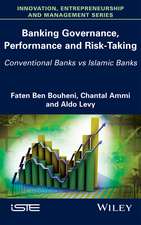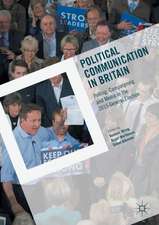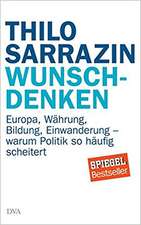Authoritarianism, Cultural History, and Political Resistance in Latin America: Exposing Paraguay: Memory Politics and Transitional Justice
Editat de Federico Pous, Alejandro Quin, Marcelino Vieraen Limba Engleză Hardback – 6 oct 2017
| Toate formatele și edițiile | Preț | Express |
|---|---|---|
| Paperback (1) | 740.55 lei 38-44 zile | |
| Springer International Publishing – 14 aug 2018 | 740.55 lei 38-44 zile | |
| Hardback (1) | 789.98 lei 43-57 zile | |
| Springer International Publishing – 6 oct 2017 | 789.98 lei 43-57 zile |
Din seria Memory Politics and Transitional Justice
- 15%
 Preț: 579.52 lei
Preț: 579.52 lei - 20%
 Preț: 691.19 lei
Preț: 691.19 lei - 15%
 Preț: 588.50 lei
Preț: 588.50 lei -
 Preț: 386.99 lei
Preț: 386.99 lei -
 Preț: 387.75 lei
Preț: 387.75 lei -
 Preț: 384.86 lei
Preț: 384.86 lei -
 Preț: 383.71 lei
Preț: 383.71 lei - 15%
 Preț: 693.90 lei
Preț: 693.90 lei - 15%
 Preț: 698.80 lei
Preț: 698.80 lei - 18%
 Preț: 727.00 lei
Preț: 727.00 lei - 18%
 Preț: 779.26 lei
Preț: 779.26 lei - 18%
 Preț: 889.43 lei
Preț: 889.43 lei -
 Preț: 453.21 lei
Preț: 453.21 lei - 15%
 Preț: 691.91 lei
Preț: 691.91 lei -
 Preț: 416.71 lei
Preț: 416.71 lei - 18%
 Preț: 729.68 lei
Preț: 729.68 lei -
 Preț: 417.68 lei
Preț: 417.68 lei -
 Preț: 447.99 lei
Preț: 447.99 lei -
 Preț: 484.47 lei
Preț: 484.47 lei - 18%
 Preț: 782.72 lei
Preț: 782.72 lei - 18%
 Preț: 732.40 lei
Preț: 732.40 lei
Preț: 789.98 lei
Preț vechi: 963.39 lei
-18% Nou
Puncte Express: 1185
Preț estimativ în valută:
151.21€ • 164.30$ • 127.10£
151.21€ • 164.30$ • 127.10£
Carte tipărită la comandă
Livrare economică 21 aprilie-05 mai
Preluare comenzi: 021 569.72.76
Specificații
ISBN-13: 9783319535432
ISBN-10: 3319535439
Pagini: 318
Ilustrații: XIX, 301 p. 8 illus. in color.
Dimensiuni: 148 x 210 mm
Greutate: 0.67 kg
Ediția:1st ed. 2018
Editura: Springer International Publishing
Colecția Palgrave Macmillan
Seria Memory Politics and Transitional Justice
Locul publicării:Cham, Switzerland
ISBN-10: 3319535439
Pagini: 318
Ilustrații: XIX, 301 p. 8 illus. in color.
Dimensiuni: 148 x 210 mm
Greutate: 0.67 kg
Ediția:1st ed. 2018
Editura: Springer International Publishing
Colecția Palgrave Macmillan
Seria Memory Politics and Transitional Justice
Locul publicării:Cham, Switzerland
Cuprins
1. Introduction: Exposing Paraguay.- 2. War and Dismemberment: The Paraguayan War According to León de Palleja’s Diario (1866).- 3. Poetry and Revisionism. Notes on Authority and Restoration in Postwar Paraguay.- 4. Writing the State: The Re-Distribution of Sovereignty and the Figure of the “Legislator” in I the Supreme by Augusto Roa Bastos.- 5. Indigenous Art: The Challenge of the Universal.- 6. Inheritances of Carlos Colombino. Painting and the Making of a Democratic Paraguay.- 7. Interrupted Visions of History: Nineteenth-century Illustrated Newspapers and the History of (Popular) Art in Contemporary Paraguay.- 8. The Wings of Carlos Colombino: Architect, Artist, Writer (An Interview).- 9. Beyond Coercion: Social Legitimation and Conservative Modernization in the Stroessner Regime (1954-1989).- 10. 108/Cuchillo de palo (2010): Limits and Political Potentialities of Queer Countermemory.- 11. De-parting Paraguay: The Interruption of the Aesthetic Gaze in Siete Cajas (2012).- 12. Paraguayan Counterlives.- 13. Paraguayan Realism as Cruelty in Gabriel Casaccia’s El guajhú.- 14. Rafael Barrett’s Haunted Letter.
Notă biografică
Federico Pous is Assistant Professor of Spanish in the Department of World Languages and Cultures at Elon University, USA.
Alejandro Quin teaches modern and contemporary Latin American literature and culture at the University of Utah, USA.
Marcelino Viera is Assistant Professor of Spanish & Latin American Studies in the Department of Humanities at Michigan Technological University, USA.
Textul de pe ultima copertă
This book takes on the challenge of conceptually thinking Paraguayan cultural history within the broader field of Latin American studies. It presents original contributions to the study of Paraguayan culture from a variety of perspectives that include visual, literary, and cultural studies; gender studies, sociology, and political theory. The essays compiled here focus on the different narratives and political processes that shaped a country decentered from, but also deeply connected to, the rest of Latin America. Structured in four thematic sections, the book reflects upon authoritarianism; the tensions between modern, indigenous, and popular artistic expressions; the legacies of the Stroessner Regime, political resistance, and the struggle for collective memory; as well as the literary framing of historical trauma, particularly in connection with the Roabastian notion of la realidad que delira [delirious reality].
Caracteristici
Offers in-depth case studies and analyses of the tensions, ruptures, and reciprocal mediations between culture and politics throughout Paraguay’s historical evolution Reconsiders the crucial importance of Paraguayan culture within the broader regional context in which the country has been constituted Addresses the lack of a significant body of English-language publications on Paraguayan cultural history and production through the contributions of both emerging and established scholars Includes supplementary material: sn.pub/extras
